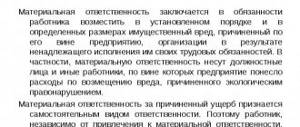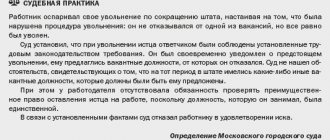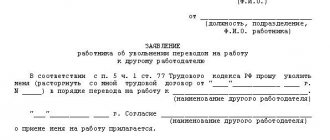Concept
Light activity or light work - transfer of a worker to a more suitable job for medical reasons . There may be several reasons for such a translation:
- injury at work;
- pregnancy (Article 254 of the Labor Code of the Russian Federation);
- raising a child under 1.5 years of age;
- recent surgery;
- serious disease.
The Labor Code does not have a clear definition of what “light labor” is, so in each case it is considered individually. The job must be as prescribed by a physician and the average median salary must be maintained at or above pre-injury/illness levels . Such an employee can be involved in overtime work only by consent and without causing harm to health .
Evasion or refusal by the boss to provide a transfer without good reason is considered a violation of labor laws. The procedure for switching to light labor is formalized by Art. 73 Labor Code of the Russian Federation.
If an employee refuses to change activities to a simpler job or the organization does not have suitable vacancies, the employer is obliged to suspend the employee with retention of position for up to four months.
Salaries for this period will not be accrued unless otherwise provided by the employment contract, agreement or other paragraphs of the Labor Code and Federal Law. If the period of limited working capacity is 4 months or more (or in the case of a need for permanent transfer), the employer has the right to terminate the contract based on Art. 77 Labor Code of the Russian Federation.
Article 73 of the Labor Code of the Russian Federation
Table of contents
Changes to the Labor Code of the Russian Federation
Quick search by articles
Comments on Article 73 of the Labor Code of the Russian Federation
An employee who needs to be transferred to another job in accordance with a medical report issued in the manner established by federal laws and other regulatory legal acts of the Russian Federation, with his written consent, the employer is obliged to transfer to another job available to the employer that is not contraindicated for the employee for health reasons.
If an employee who, in accordance with a medical report, needs a temporary transfer to another job for a period of up to four months, refuses the transfer or the employer does not have the corresponding job, then the employer is obliged to suspend the employee from work for the entire period specified in the medical report while maintaining his job ( positions). During the period of suspension from work, wages are not accrued to the employee, except in cases provided for by this Code, other federal laws, collective agreements, agreements, and employment contracts.
If, in accordance with a medical report, an employee needs a temporary transfer to another job for a period of more than four months or a permanent transfer, then if he refuses the transfer or the employer does not have the corresponding job, the employment contract is terminated in accordance with paragraph 8 of part one of Article 77 of this Code .
An employment contract with the heads of organizations (branches, representative offices or other separate structural units), their deputies and chief accountants who, in accordance with a medical report, need a temporary or permanent transfer to another job, if the transfer is refused or the employer does not have the corresponding job, is terminated in in accordance with paragraph 8 of part one of Article 77 of this Code. The employer has the right, with the written consent of these employees, not to terminate their employment contract, but to remove them from work for a period determined by agreement of the parties. During the period of suspension from work, wages are not accrued to these employees, except for the cases provided for by this Code, other federal laws, collective agreements, agreements, and employment contracts.
Publications on the topic
- Suspension from work
- Removal from work for medical reasons
- Transfer of an employee
- Labor relations between employer and employee
Article 73 of the Labor Code of the Russian Federation talks about the conditions for transferring an employee to another job in accordance with a medical report. In accordance with Article 73 of the Labor Code of the Russian Federation, the employer is obliged to transfer an employee who needs to be transferred for medical reasons to another job for a period of up to four months. The text of Article 73 of the Labor Code of the Russian Federation also states that if the employee refuses to transfer or the employer does not have a suitable job, the employee is suspended from work for the period specified in the medical report.
Was this material useful to you? Save so you don't lose!
Thank you! Your application has been accepted, our specialist will contact you shortly.
How to get a medical certificate
Obtaining a certificate confirming the need for light work due to health reasons is legal in the following cases:
- Having a disability. In our case, this will be an acquired disability that prevents the employee from performing his duties in full.
Pregnancy. The most common reason for leaving for another position is light work. We have already discussed pregnancy as a reason for lightening the load in another article.
- Long-term rehabilitation after surgery . These include, for example, spinal surgery.
- Some types of diseases . The longer the recovery period, the greater the chance that the doctor will sign the certificate.
Bodily injury and mutilation. Particular attention is paid to injuries sustained by an employee in the performance of official duties.
Options for transitioning to a new job may change due to the degree of impairment of the employee. The type of certificate that the employee will have to provide to the manager also depends on this.
Content
The format of the certificate may differ depending on the place of issue and the basis for transfer to light labor. The certificate must contain full name. the person who will receive the document, the place and date of the examination, general recommendations on working conditions and grounds for transfer, as well as the doctor’s signature certified by the seal of the medical institution.
You can receive a conclusion on transfer to light work in several forms:
- conclusion of the commission or the attending physician (according to Law No. 323-FZ);
- rehabilitation program for disabled people;
- conclusion based on the results of a mandatory medical examination for hazardous work (Order of the Ministry of Health No. 302n);
- rehabilitation program in case of an accident at work;
- standard conclusion based on the results of an examination in a medical institution (Order of the Ministry of Health No. 441n).
When you receive a certificate at the clinic, it will look something like this.
The medical professional has the form of certificate required in a particular case.
How to properly prepare a translation
To transfer to a lighter form of work, the employee and the employer need to collect a package of documents:
- Medical certificate in one of the above options.
- An application in free form or according to the company’s sample, in which the employee asks to be transferred to a position with different operating conditions.
- Additional agreement signed by the employee and the manager, which describes their relationship for the period of validity of the certificate.
- Order for transfer to a position.
So, the algorithm for processing the transfer of an employee to light work will look like this:
- The first step is to provide the employer free-form transfer application
- The employer reviews the application and signs an order of dismissal .
- In addition to the general director, the document is certified by the chief accountant and all direct management of the employee.
- The director can then submit a proposal for transfer to the position in writing , indicating the salary and period of replacement. The employee may or may not sign the offer.
- The translation is made in accordance with Art. 72 of the Labor Code of the Russian Federation and entails a change in the employee’s duties, place of work and salary . All these changes are noted in the additional agreement to the employment contract.
- is drawn up in standard (T-5) form for transfer to another job . The employee must familiarize himself with the order against signature, receive a new job description and receive the regulations required upon taking up the position. You will also have to make an additional entry in the work book if the transfer is permanent.
Comments on the article
Article 73 is devoted to the transfer to another job of an employee who, in accordance with a medical report, needs such a transfer. In accordance with the commented article, it is possible to transfer an employee not only to another permanent job, but also to a temporary one, if, in accordance with a medical report, the employee needs a temporary transfer to another job. The presence in the Labor Code of special rules regulating the procedure for transferring an employee who, in accordance with a medical report, needs to be transferred to another job, makes it possible to resolve many problems that arise in practice.
In accordance with Part 1 of the commented article, the employer’s obligation to transfer an employee to another job (permanently or temporarily) arises if the following conditions are met: 1) such a transfer is necessary in accordance with a medical report; 2) the medical report was issued in the manner established by federal laws and other regulatory legal acts of the Russian Federation; 3) the employer has relevant work, and it is not contraindicated for the employee due to health reasons; 4) the employee has given written consent to be transferred to another job.
If an employee who, in accordance with a medical report, needs a temporary transfer to another job, refuses the job offered by the employer or the employer does not have the appropriate job, then there are two possible solutions to this problem depending on the period for which the transfer is needed:
- if the period for which the transfer is required does not exceed four months, then the employer is obliged to suspend the employee from work for the entire period specified in the medical report while maintaining his place of work (position) (Part 2 of Article 73);
- if a temporary transfer to another job is necessary for the employee for more than four months or the employee needs a permanent transfer to another job, then the employment contract with the employee is terminated on the basis of clause 8 of Part 1 of Art. (Part 3 of Article 73).
Special rules are established for employees holding positions of heads of organizations (branches, representative offices or other separate structural units), their deputies and chief accountants and who, in accordance with a medical report, need a temporary transfer to another job (Part 4 of Article 73).
The employment contract with such employees, in the event of their refusal to transfer or if the employer does not have the corresponding work, is terminated on the basis of clause 8, part 1, art. Labor Code, regardless of how long, in accordance with the medical report, they need to be transferred to another job. At the same time, the employer has the right, with the written consent of these employees, not to terminate their employment contract, but to remove them from work for a period determined by agreement of the parties.
When dismissing employees on the basis of clause 8, part 1, art. 77 of the Labor Code, they are paid severance pay in the amount of two weeks’ average earnings (see commentary to Article 178).
During the period of suspension of employees from work in cases provided for in parts 2 and 4 of the commented article, wages are not accrued to them. The exception is cases provided for by the Labor Code, other federal laws, collective agreements, agreements, and employment contracts.
How is it paid?
Wages for light work cannot be lower than the average salary for performing ordinary duties. Such a proposal is unlawful according to Art. 254 Labor Code of the Russian Federation.
For example, if before the transfer an employee received about 30,000 rubles a month, then the salary in the new place should be from 25-30 thousand rubles.
An exception is the transition to part-time work; when this is done, the salary is reduced in proportion to the hours worked.
For example, when switching to an incomplete 30-hour week, an employee will completely legally lose a quarter of his salary, and 30,000 rubles will turn into 22,500.
In the case of a transfer to a position with a noticeably higher salary, the employer needs to be prepared to report on the employee’s qualifications to the Social Security Fund, which may consider such highly paid work as fraud in order to increase the amount of benefits. This may result in the company being denied reimbursement of government benefits.
Sick leave and vacation
Sick leave is calculated as usual, as in normal work. We remind you that the benefit is directly related to length of service and earnings. With eight years of experience or more, the employee will receive 100% of earnings, with five to eight years of experience - 80%, with less than 5 years of experience - 60%.
The category of workers engaged in light labor has the right to an annual paid leave of one month or unpaid leave for 60 days at their choice.
Commentary on Article 73 of the Labor Code of the Russian Federation
1. When transferring an employee for medical reasons, the initiator of such transfer is the relevant medical organization. The basis for the corresponding medical report is a change in the employee’s health status, i.e. the emergence of a factor that is objective for the parties to the employment contract. As noted above, a medical certificate issued in the prescribed manner about the employee’s need for transfer to another job is mandatory for the employer, but the transfer can only be carried out with the written consent of the employee.
2. As follows from the content of the commented article, the fate of an employment contract with an employee who needs a transfer for health reasons, but refuses such a transfer, as well as if the employer does not have the corresponding work, is determined by the period of transfer.
If the period of transfer to another job according to a medical report does not exceed four months, then if the employee refuses the transfer or the employer does not have the appropriate work, the employee is suspended from work with the payment of his wages suspended.
Persons who are carriers of pathogens of infectious diseases, if they can become sources of the spread of infectious diseases due to the characteristics of production or the work they perform, with their consent, are temporarily transferred to another job that is not associated with the risk of the spread of infectious diseases. If it is impossible to transfer on the basis of decisions of the chief state sanitary doctors and their deputies, they are temporarily suspended from work with the payment of social insurance benefits (Article 33 of the Federal Law of March 30, 1999 N 52-FZ “On the Sanitary and Epidemiological Welfare of the Population”).
If, due to a medical report, an employee needs a temporary transfer for a period of more than four months or a permanent transfer, then if he refuses the transfer or if the employer does not have the appropriate work, the employment contract is terminated in accordance with clause 8 of Art. 77 TK.
3. Parts 2 and 3 of the commented article determine the fate of the employment contract in different ways.
If the circumstances specified in Part 3 of the commented article occur, the employment contract is terminated from the moment the employer receives a medical certificate (if the employer does not have the relevant work) or from the moment the employee refuses the proposed transfer. Contrary to the mandatory nature of this rule, an employment contract can be preserved by agreement of the parties (for example, an employee is suspended from work until the expected moment when a corresponding vacancy arises at the employer, regardless of the fact that the expected period of its occurrence exceeds four months and cannot be determined accurately at all).
If the medical conclusion is based on the fact that the period of temporary incapacity for work of the employee will not last more than four months, then if it is impossible to transfer to another job in the event of the employee’s refusal or lack of corresponding work, the employee is suspended from work and the employment contract with him is preserved by virtue of the direct instructions of the law. It should be assumed that the law establishes the maximum duration of temporary disability during which a suspended employee retains his job, but not the number of such suspensions. If an employee returns to work at the end of the relevant period, he must be provided with work according to the labor function stipulated by the employment contract. In the event of a new period of incapacity for work, the rules established respectively in part 2 or part 3 of the commented article are again subject to application.
The question remains open: what are the legal consequences if the employee’s incapacity for work actually lasted more than four months?
It seems that if by the end of the four-month period (or a period of shorter duration specified in the medical report) the employee has undergone a new medical examination and a new medical report has been issued to him, then the rules provided for, respectively, part 2 or 3 of the commented article should be applied. In other words, the new medical report cannot be “reverted”, and, therefore, if, according to it, the employee’s incapacity for work is limited to four months, then the rules established by part 2 of the commented article apply; if its duration is expected to be more than four months or is permanent, then it is possible to apply the norm provided for in Part 3 of the commented article.
4. On the transfer of women to another job due to pregnancy or the presence of children under the age of one and a half years, see Art. 254 TC and commentary to it.
Transfer deadlines
Transfer to light work can last either a limited time (for illnesses and injuries) or an unlimited time (disability, chronic diseases, injuries). With a medical prescription for up to 4 months, the employer does not have the right to dismiss the employee, only to suspend him for the period of reduced working capacity with the same salary, or offer other comparable options.
If easier conditions are required for a period of more than 4 months, then the organization may dismiss the employee with payment of severance pay.
After the end of the term, the employee can retain a new position by mutual agreement with the employer, in which case the term of work in the additional agreement is canceled, and the contract is considered automatically extended. Do not also forget that the employee has the option of resigning at his own request at any time.







